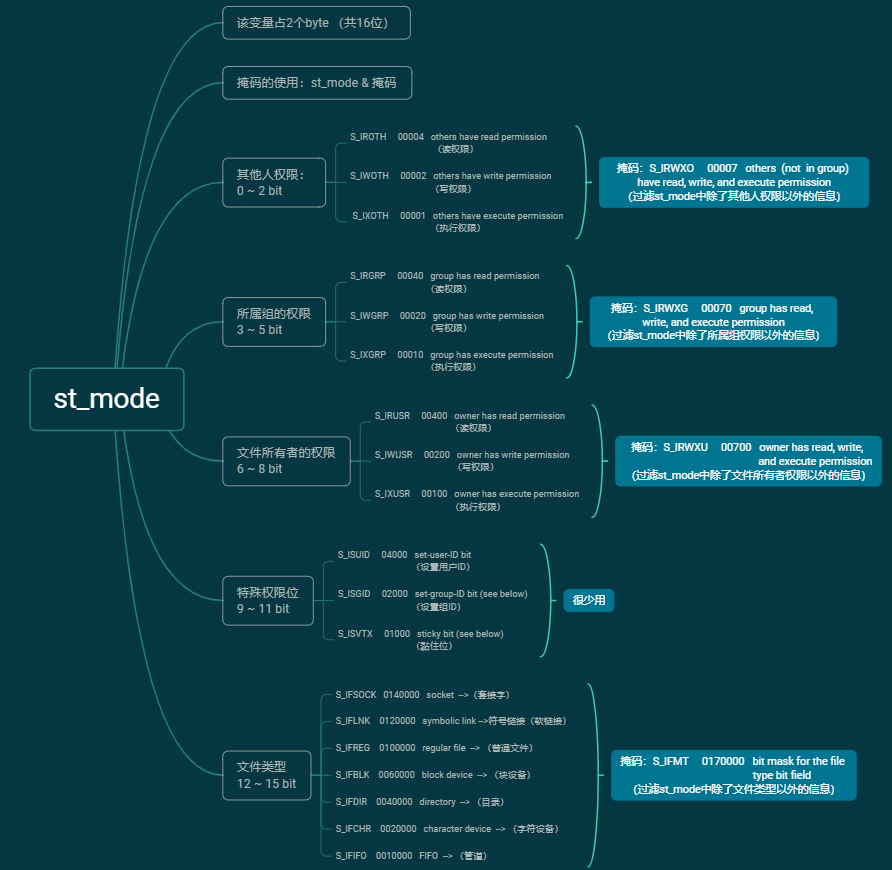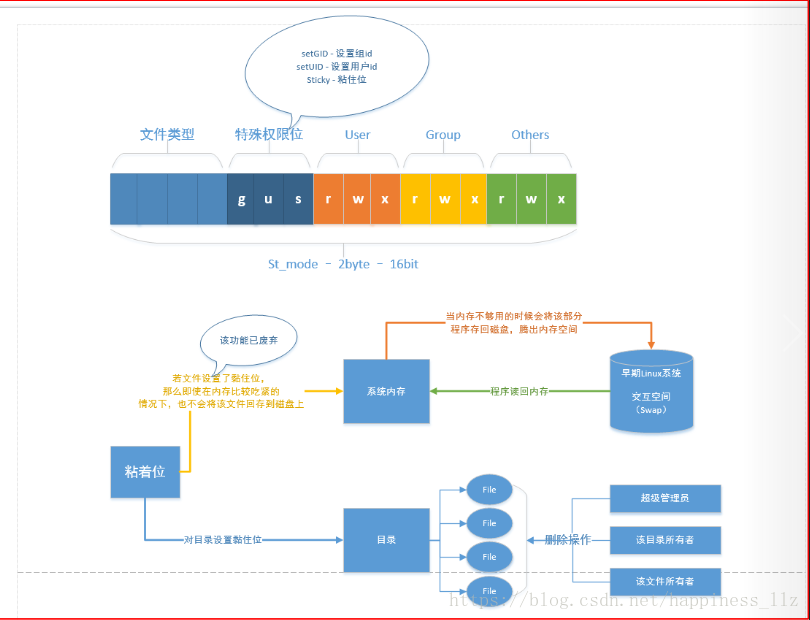一、整体大纲

st_mode整体介绍:

st_mode详细介绍:

二、 Linux文件操作相关函数
1. stat
- 作用:获得文件信息,也可以获取文件大小。
- 头文件
1 #include <sys/types.h> 2 #include <sys/stat.h> 3 #include <unistd.h>
- 函数原型
1 int stat(const char *path, struct stat *buf); 2 int fstat(int fd, struct stat *buf); 3 int lstat(const char *path, struct stat *buf);
- 参数说明:
path文件名
buf传出参数,定义结构体struct stat sb; &sb
- 返回值
失败:返回-1,设置errno
成功:返回0
注意: stat碰到链接,会追溯到源文件,穿透!!!lstat并不会穿透。
stat结构体:

1 struct stat { 2 dev_t st_dev; /* ID of device containing file */ 3 ino_t st_ino; /* inode number */ 4 mode_t st_mode; /* protection */ 5 nlink_t st_nlink; /* number of hard links */ 6 uid_t st_uid; /* user ID of owner */ 7 gid_t st_gid; /* group ID of owner */ 8 dev_t st_rdev; /* device ID (if special file) */ 9 off_t st_size; /* total size, in bytes */ 10 blksize_t st_blksize; /* blocksize for file system I/O */ 11 blkcnt_t st_blocks; /* number of 512B blocks allocated */ 12 13 time_t st_atime; /* time of last access */ 14 time_t st_mtime; /* time of last modification */ 15 time_t st_ctime; /* time of last status change */ 16 };
linux命令stat执行结果:
1 [root@centos linuxC]# stat stat.c 2 文件:"stat.c" 3 大小:1857 块:8 IO 块:4096 普通文件 4 设备:fd00h/64768d Inode:17763202 硬链接:1 5 权限:(0644/-rw-r--r--) Uid:( 0/ root) Gid:( 0/ root) 6 环境:unconfined_u:object_r:usr_t:s0 7 最近访问:2019-04-27 19:17:15.149083960 +0800 8 最近更改:2019-04-27 19:17:15.149083960 +0800 9 最近改动:2019-04-27 19:17:15.202084912 +0800
注意三个时间的区别
1 time_t st_atime; /* time of last access */ 文件被读,比如cat,open读等 2 time_t st_mtime; /* time of last modification */ 文件内容发生改变 3 time_t st_ctime; /* time of last status change */ 文件属性发生变化,比如大小,权限,硬连接数等

上图的解释:
0-2 其他用户权限 3-5 组用户权限 6-8 用户权限 9-11 特殊权限位 12-15 文件类型
示例:

1 #include <sys/types.h> 2 #include <sys/stat.h> 3 #include <time.h> 4 #include <stdio.h> 5 #include <stdlib.h> 6 7 int 8 main(int argc, char *argv[]) 9 { 10 struct stat sb; 11 12 if (argc != 2) { 13 fprintf(stderr, "Usage: %s <pathname> ", argv[0]); 14 exit(EXIT_FAILURE); 15 } 16 17 if (stat(argv[1], &sb) == -1) { 18 perror("stat"); 19 exit(EXIT_FAILURE); 20 } 21 22 printf("File type: "); 23 24 switch (sb.st_mode & S_IFMT) { 25 case S_IFBLK: printf("block device "); break; 26 case S_IFCHR: printf("character device "); break; 27 case S_IFDIR: printf("directory "); break; 28 case S_IFIFO: printf("FIFO/pipe "); break; 29 case S_IFLNK: printf("symlink "); break; 30 case S_IFREG: printf("regular file "); break; 31 case S_IFSOCK: printf("socket "); break; 32 default: printf("unknown? "); break; 33 } 34 printf("I-node number: %ld ", (long) sb.st_ino); 35 36 printf("Mode: %lo (octal) ", 37 (unsigned long) sb.st_mode); 38 39 printf("Link count: %ld ", (long) sb.st_nlink); 40 printf("Ownership: UID=%ld GID=%ld ", 41 (long) sb.st_uid, (long) sb.st_gid); 42 43 printf("Preferred I/O block size: %ld bytes ", 44 (long) sb.st_blksize); 45 printf("File size: %lld bytes ", 46 (long long) sb.st_size); 47 printf("Blocks allocated: %lld ", 48 (long long) sb.st_blocks); 49 50 printf("Last status change: %s", ctime(&sb.st_ctime)); 51 printf("Last file access: %s", ctime(&sb.st_atime)); 52 printf("Last file modification: %s", ctime(&sb.st_mtime)); 53 54 exit(EXIT_SUCCESS); 55 } 56 57 Linux自带示例(打印文件相关信息)
需求:使用stat实现实现 ls -l 的功能?如下所示
1 [root@centos linuxC]# ll -l xx.log 2 -rw-r--r--. 1 root root 0 4月 27 23:25 xx.log
在实现的过程中需要获取用户名及组名,因此先看两个函数:
1)getpwuid
- 作用:通过用户的uid获取用户名
- 头文件
1 #include <sys/types.h> 2 #include <pwd.h>
- 函数原型
1 struct passwd *getpwuid(uid_t uid);
- 参数说明:
uid用户的uid
- 返回值
失败:返回NULL
成功:返回 struct passwd * 结构体指针
其中:

1 struct passwd { 2 char *pw_name; /* username */ 用户名 3 char *pw_passwd; /* user password */ 4 uid_t pw_uid; /* user ID */ 5 gid_t pw_gid; /* group ID */ 6 char *pw_gecos; /* user information */ 7 char *pw_dir; /* home directory */ 8 char *pw_shell; /* shell program */ 9 };
2)getgrgid
- 作用:通过用户的gid获取用户组名
- 头文件
1 #include <sys/types.h> 2 #include <grp.h>
- 函数原型
1 struct group *getgrgid(gid_t gid);
- 参数说明:
gid用户组的gid
- 返回值
失败:返回NULL
成功:返回 struct group * 结构体指针
其中:

1 struct group { 2 char *gr_name; /* group name */ 3 char *gr_passwd; /* group password */ 4 gid_t gr_gid; /* group ID */ 5 char **gr_mem; /* group members */ 6 };
3)localtime
- 作用:获取本地时间
- 头文件
1 #include <time.h>
- 函数原型
1 struct tm *localtime(const time_t *timep);
- 参数说明:
timep:一个时间相关的结构体
- 返回值
失败:返回NULL
成功:返回 struct tm * 结构体指针
其中:

1 struct tm { 2 int tm_sec; /* seconds */ 3 int tm_min; /* minutes */ 4 int tm_hour; /* hours */ 5 int tm_mday; /* day of the month */ 6 int tm_mon; /* month */ 7 int tm_year; /* year */ 8 int tm_wday; /* day of the week */ 9 int tm_yday; /* day in the year */ 10 int tm_isdst; /* daylight saving time */ 11 };
传入参数 timep 对应stat函数得到的结构体的秒数(time_t类型)。
最终实现:

1 #include<stdio.h> 2 #include<unistd.h> 3 #include<sys/types.h> 4 #include<sys/stat.h> 5 #include<fcntl.h> 6 #include<string.h> 7 #include<time.h> 8 #include <grp.h> 9 #include <pwd.h> 10 11 int main(int argc, char *argv[]) 12 { 13 if (argc != 2) 14 { 15 printf("./a.out filename "); 16 return -1; 17 } 18 struct stat sb; 19 stat(argv[1], &sb); 20 21 char stmode[11] = {0}; 22 memset(stmode, '-', sizeof(stmode)-1); 23 24 //解析文件属性 25 if (S_ISREG(sb.st_mode)) stmode[0] = '-'; //普通文件 26 if (S_ISDIR(sb.st_mode)) stmode[0] = 'd'; 27 if (S_ISCHR(sb.st_mode)) stmode[0] = 'c'; 28 if (S_ISBLK(sb.st_mode)) stmode[0] = 'b'; 29 if (S_ISFIFO(sb.st_mode)) stmode[0] = 'p'; 30 if (S_ISLNK(sb.st_mode)) stmode[0] = 'l'; 31 if (S_ISSOCK(sb.st_mode)) stmode[0] = 's'; 32 33 //解析权限 34 //user 35 if (sb.st_mode & S_IRUSR) stmode[1] = 'r'; 36 if (sb.st_mode & S_IWUSR) stmode[2] = 'w'; 37 if (sb.st_mode & S_IXUSR) stmode[3] = 'x'; 38 //group 39 if (sb.st_mode & S_IRGRP) stmode[4] = 'r'; 40 if (sb.st_mode & S_IWGRP) stmode[5] = 'w'; 41 if (sb.st_mode & S_IXGRP) stmode[6] = 'x'; 42 //other 43 if (sb.st_mode & S_IROTH) stmode[7] = 'r'; 44 if (sb.st_mode & S_IWOTH) stmode[9] = 'w'; 45 if (sb.st_mode & S_IXOTH) stmode[10] = 'x'; 46 47 //分析 用户名,组名可以通过函数获得 getpwuid, getgrgid 48 //时间获取 49 struct tm *filetm = localtime(&sb.st_atim.tv_sec); 50 char timebuf[20] = {0}; 51 sprintf(timebuf, "%d月 %d %02d:%02d", filetm->tm_mon+1, filetm->tm_mday, filetm->tm_hour, filetm->tm_min); 52 53 printf("%s %ld %s %s %ld %s %s ", stmode, sb.st_nlink, getpwuid(sb.st_uid)->pw_name, 54 getgrgid(sb.st_gid)->gr_name, sb.st_size, timebuf, argv[1]); 55 56 return 0; 57 } 58 59 使用stat实现一个ls -l命令
2. access
- 作用:测试指定文件是否有某种权限
- 头文件
1 #include <unistd.h>
- 函数原型
1 int access(const char *pathname, int mode);
- 参数说明:
pathname文件名
mode:
R_OK
W_OK
X_OK
F_OK
- 返回值
失败:返回-1,设置errno
成功:如果有权限或者文件存在,对应返回0

1 #include<stdio.h> 2 #include <unistd.h> 3 4 int main(int argc, char *argv[]) 5 { 6 if (argc != 2) 7 { 8 printf("./a.out filename "); 9 return -1; 10 } 11 if (access(argv[1], R_OK) == 0) printf("%s read ok! ", argv[1]); 12 if (access(argv[1], W_OK) == 0) printf("%s write ok! ", argv[1]); 13 if (access(argv[1], X_OK) == 0) printf("%s exe ok! ", argv[1]); 14 if (access(argv[1], F_OK) == 0) printf("%s file exists! ", argv[1]); 15 16 return 0; 17 18 } 19 20 判断文件读写执行及文件是否存在
3. chmod
1 #include <sys/stat.h> 2 int chmod(const char *path, mode_t mode);
4. truncate
- 函数作用:截断文件
- 头文件
1 #include <unistd.h> 2 #include <sys/types.h>
- 函数原型
1 int truncate(const char *path, off_t length); 2 int ftruncate(int fd, off_t length);
- 参数说明:
path文件名
length长度,长度如果大于原文件,直接拓展,如果小于原文件,截断为length长度。
- 返回值
成功:返回0
失败:返回-1,设置errno
示例:

1 #include<stdio.h> 2 #include<sys/types.h> 3 #include<stdio.h> 4 5 int main(int argc, char *argv[]) 6 { 7 if (argc != 2) 8 { 9 printf("./a.out filename "); 10 return -1; 11 } 12 truncate(argv[1], 1024); 13 return 0; 14 } 15 16 truncate示例
5. link
- 函数作用:创建硬连接
- 头文件
1 #include <unistd.h>
- 函数原型
1 int link(const char *oldpath, const char *newpath);
- 参数说明:
oldpath原文件
newpath硬连接文件
- 返回值
成功:返回0
失败:返回-1,设置errno
示例:

1 #include<stdio.h> 2 #include <unistd.h> 3 4 int main(int argc, char *argv[]) 5 { 6 if (argc != 2) 7 { 8 printf("./a.out filename "); 9 return -1; 10 } 11 12 char filename[1024] = {0}; 13 sprintf(filename, "%s_hard", argv[1]); 14 15 link(argv[1], filename); 16 17 return 0; 18 } 19 20 创建硬连接示例
6. symlink
- 函数作用:创建软连接
- 头文件
1 #include <unistd.h>
- 函数原型
1 int symlink(const char *oldpath, const char *newpath);
- 参数解释:
oldpath原文件
newpath创建软连接文件
- 返回值
成功:返回0
失败:返回-1,设置errno
示例:

1 #include<stdio.h> 2 #include <unistd.h> 3 4 int main(int argc, char *argv[]) 5 { 6 if (argc != 2) 7 { 8 printf("./a.out filename "); 9 return -1; 10 } 11 12 char filename[1024] = {0}; 13 sprintf(filename, "%s_soft", argv[1]); 14 15 symlink(argv[1], filename); 16 17 return 0; 18 } 19 20 创建软连接
6. readlink
- 函数作用:读取文件链接信息
- 头文件
1 #include <unistd.h>
- 函数原型
1 ssize_t readlink(const char *path, char *buf, size_t bufsiz);
- 参数解释:
path链接名
buf缓冲区
bufsiz缓冲区大小
- 返回值
成功:返回buf填充的大小
失败:返回-1,设置errno
示例:

1 #include<stdio.h> 2 #include <unistd.h> 3 4 int main(int argc, char *argv[]) 5 { 6 if (argc != 2) 7 { 8 printf("./a.out filename "); 9 return -1; 10 } 11 12 char buf[32] = {0}; 13 readlink(argv[1], buf, sizeof(buf)); 14 printf("buf is %s ", buf); 15 16 unlink(argv[1]); 17 18 return 0; 19 } 20 21 readlink示例
7. unlink
- 函数作用:删除软硬链接
- 头文件
1 #include <unistd.h>
- 函数原型
1 int unlink(const char *pathname);
- 函数参数:
pathname 链接名,文件也可以
- 返回值
成功:返回0
失败:返回-1,设置errno
示例:

1 #include<stdio.h> 2 #include <unistd.h> 3 #include<stdlib.h> 4 #include<fcntl.h> 5 #include<string.h> 6 #include<sys/types.h> 7 8 int main(int argc, char *argv[]) 9 { 10 if (argc != 2) 11 { 12 printf("./a.out filename "); 13 return -1; 14 } 15 16 int fd = open(argv[1], O_WRONLY|O_CREAT, 0666); 17 //注意只要有进程在使用该文件,则unlink在该文件退出时删除该文件 18 unlink(argv[1]); 19 20 int ret = write(fd, "hello", 5); 21 if (ret > 0) 22 { 23 printf("write ok! %d ", ret); 24 } 25 if (ret < 0) 26 { 27 perror("write err"); 28 } 29 30 close(fd); 31 32 return 0; 33 } 34 35 unlink示例
8. chown
- 函数作用:修改文件属主及属组
- 头文件
1 #include <unistd.h>
- 函数原型
1 int chown(const char *path, uid_t owner, gid_t group);
- 函数参数:
path文件名
owner用户ID,/etc/passwd
owner组ID,/etc/group
- 返回值
成功:返回0
失败:返回-1,设置errno
9. rename
- 函数作用:文件或者目录重命名
- 头文件
1 #include <stdio.h>
- 函数原型
1 int rename(const char *oldpath, const char *newpath);
- 参数说明:
oldpath文件名
newpath文件新名
- 返回值
成功:返回0
失败:返回-1,设置errno
示例:

1 #include<stdio.h> 2 3 int main(int argc, char *argv[]) 4 { 5 if (argc != 2) 6 { 7 printf("./a.out filename "); 8 return -1; 9 } 10 11 char buf[1024] = {0}; 12 sprintf(buf, "%s_new", argv[1]); 13 rename(argv[1], buf); 14 15 return 0; 16 } 17 18 rename示例
